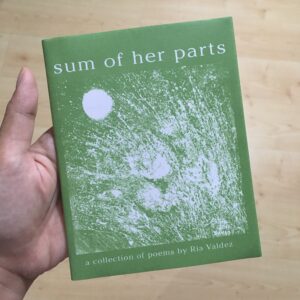
Ria Valdez’s Sum of her parts is a collection of lesbian poetry published by the Road Map Heritage Series, established in 1981, in Davao City, Philippines. Printed by Imageworld, Davao City, Philippines, 2021.
Love poems are increasingly becoming obsolete in these days of Holocene extinction. Lovers since Romeo and Juliethave been tagging each other closer to the precipice. Not their fault because it is the only plot there is. The end phrase “And they lived happily ever after…” is of course for children’s story books. But wait a second.
When love poems are written by a female for another of her own gender, well, that is a form of ironic differentiation.
There is more to differentiation than what the resistance claims. For one, I personally believe the Homo s. Sapiens needs to differentiate while going through the Anthropocene in order to survive the extinction process. What really is there when a person, a female by gender, loves another female, erotically especially?
Sum of her parts by Ria Valdez is lesbian poetry. It is not for male chauvinists. Forget it if you are one. They that made society awry and are beyond character reform will shamelessly uphold the lie that man is superior among women, animals, plants, and ants, even if they have to die in a self-initiated nuclear holocaust or viral pandemic. Male chauvinisms are the real aberrant factor that disrupted the planet’s yin-yang balance; causing sparks of the female yin to jump off and cross over to the male yang sphere to form an embryo to retain a semblance of balance.
Lawmakers if they have the poetic knack should consider Valdez a must-read for in-depth legislation liberative of an embryonic sector. Psychologists, too, should swap some textbooks for her poetry to learn gender novelty beyond post-graduate study, especially if Ms. Valdez commits something so juicy and absolutely wrong to the eyes of the academic community. Innovative human nature, if sexually-charged, usually explodes like an improvised home-made bomb. It is a pity Sigmund Freud and Ria Valdez missed each other by about half-a-century, maybe more.
Don’t get me wrong. While fingers—stroking, kneading, and mashing—entangled limbs, sweating skin, and maybe French kissing, play in one’s expectation as you scan Ria’s lines (and curves), it is a soul-longing so suppressed, seething with frustration, exhaustion, pain, and hope that are the bittersweet spices for her love poetry…
“You let your fingers run over the creases on cloth or
denim the way they glide across my skin
when you kiss me.
But lastly, I envy the clothes you had to fold for I want to
be folded as well.
Love, fold me—
arms and legs, hands and feet, elbows and chin tucked—
such that my body fits around yours when you hold me.
I am not part of your Sunday chores, my love.
(To my lover who does her housewife duties on a Sunday)
Her subjective self, freeing itself of rigid maternal upbringing (Things I Wished My Mother Asked Me) and college formality (Bike Ride, Valid Measurements), exults, as her fingers victoriously march under and over the arched body of her object of adoration. An exultation that costs her a discomfort and sacrifice as going against the grain eventually peters off, before eminent societal perimeters imposed as hardwired psychological paradigms, obsolete religious dogmas, and outmoded legislation.
It is not so much due to the impossibility of sexual union of similar sexes that frustrates, for how could a woman be lesby if she does not know the creative exploratory techniques involving the senses and motor organs? Over and above that, true love transcends the physical. For all of the aforementioned Valdez learns the Tao of resignation, of action with non-action, of wu-wei, the end-fortune of once pent-up and, later, spent desire.
Finding herself alone in wisdom’s breeding ground, the bed she had shared with a female athlete felt vastly liberating as a beach (Bed Positions)…
“I stretched out on the bed, the space
She used to fill. I laid there like a starfish,
Arms and legs stretched tall…I was shocked
at how big the bed was…
My edges reached out in all directions.
A new page that wouldn’t easily fold.”
She ends the collection with a well-meant advice for the woman to pose with utter beauty and well-guarded self-dignity in front of prying masculine eyes.
“Let the mounds of your breasts absorb light
From the sky until it shines enough
For stares to bounce off it…
your neck is not a cage, free your voice…
They have painted you bare, yet
you are not naked. You cannot be contained
in someone else’s piece.”
(When the World offers to paint you naked)
Science, at this point of development, will never and cannot claim gay love is the key to the sustainability of the Homo s. Sapiens as species. But who knows, in a greater context, what is being sustained is not merely the human but the universal balance and harmony of the yin-yang, the female and the male, the negative and the positive.
Sum of her parts by Ria Valdez is a fractal manifestation of the fundamental human desire to love… love that generates ever-greater diversity and harmony. As the embryo evolves in the midst of the yang domain, the logos of everything that is shall shift to accommodate change. Such is the way of a generous Providence. As narrator and interpreter, I see the emergence of a new human phylum, one that aligns with love’s calling. But, really, nobody knows yet what form it is taking.